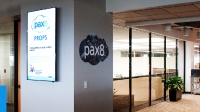Engaging Employees in The Era of Gigification
By
— March 22nd, 2022

The term ‘gig economy’ has been used to describe freelance work since around 2009, when technology apps enabled employers to pay employees for tasks completed (gigs), rather than by time.
This was particularly prevalent for taxi and delivery drivers, manual laborers, and qualified professionals who were able to contract out their services per task.
Fast forward to today, where statistics suggest that one-in-six adults in the UK currently work a gig job at least once a week with 7.25 million people expected to be "giging" by the end of this year.
Once the domain of Uber, Amazon, and other logistics companies, now brands such as Deliveroo, JustEat, Fiverr, and Upwork have virtually become household names.
Communications Planning Template for a Hybrid Workplace
Today, nearly half of gig workers in the UK (48%) also have a full-time job and 18% of UK Human Resources Directors believe that gig workers will make up 75% or more of their workforce over the next five years.
In addition to supplementing income, this flexible way of working is giving employees the ability to dictate how they want to work, as well as where and when.
Over the past 18 months, we’ve seen employees reflecting on what they want from their jobs and their employers; more flexibility, more choice of work, greater work-life balance, and the opportunity to become entrepreneurs in their own rights. Essentially to work on their terms.
With Gallagher State of the Sector (2021/22) listing employee disengagement, currently at 37% as the biggest challenge for organizations this leaves employers with the question, "How do we engage employees in our business, while giving them the autonomy to fulfill their own needs?"
The answer lies in company culture, one of the top employer concerns as employers developed their onsite/remote/hybrid office strategies for 2021 (Deloitte, Return to Workplaces Survey).
As communicators, there are three key areas where we can help to inform and influence company culture to manage this new blend of gigified employment.
- Structure
- Trust and Accountability
- Belonging and Collaboration
Structure
Gigification is not about less work, it’s about flexible work, and business leaders should provide a clear outline of their expectations about what flexibility actually means. For example, can employees choose when, how, and where they work and if so, what are the options?
Patagonia, the American outdoor clothing company, has a “Let my people go surfing time” policy where they provide a daily surf report, and employees are encouraged to catch the perfect surf while they can.
Google offers 20% time, where employees can spend a day a week working on a self-interest project, while software company, Atlassian challenges their employees to spend four days a year on any creative project.
How can you bring your culture of flexibility to life across your communications? Are you using a tone that accurately reflects the experience? In addition to providing a framework, is there an opportunity for colleagues to share their stories of how they use their flexible time and how it’s benefited them?
Trust and Accountability
The success of a flexible culture relies on the physical demonstration of trust. Is trust reflected in your organization's values? How does it show up in your organization? Are your leaders and managers mirroring this in their behaviors?
With flexible working, there is no space for micro-management. A truly trusting manager will empower their teams to deliver. Accountability is best agreed around output as opposed to time. That way, if an individual chooses to work faster or longer hours to achieve a deadline, it’s their decision.
There is also the consideration of side-hustles. Increasing numbers of employees are already running their own businesses in their spare time. Supporting this can prove beneficial as the employee develops new skills, bringing them back into the business.
Agreeing upfront work time, deadlines, and output will provide clarity around your expectations.
Trust also provides employees with the autonomy to try out new ideas without the fear of failure. Have you heard the expression "Seek forgiveness, not permission"?
Innocent Smoothies have a ‘Just go with it’ value. If an employee is 70% confident that their idea is going to make a difference, they can just go ahead and try without asking for permission; fitting with their culture that it’s better to try and fail than not try at all!
Belonging and Collaboration
We are all sentient beings, so a sense of purpose, a North Star, is tantamount to understanding how we fit into the organization. This becomes more challenging with flexible working, where belonging simply isn’t a case of sharing the same space.
This is where Leaders and Line Managers play a major role. Clear communication of how an individual supports the wider business purpose and regular affirmations of how they are achieving against it reassures and focuses the employee.
Regular Town Hall and All Hands meetings are beneficial for both employer and employee, acting as two-way forums for the sharing of information and listening to the thoughts and concerns of employees.
But communicating with the gigified workforce goes beyond cultivating a sense of belonging; it’s about creating community. Building collaborative communities of interest around both business and social interests, virtually and personally, provides opportunities to blend life and work; developing a culture that benefits both.
Recognizing and celebrating moments that matter such as successes and anniversaries will reinforce the feeling of value.
Communications Planning Template for a Hybrid Workplace
The current 4-day work week trial takes another step towards a gigified workforce as employees reduce the number of days they work per week for the same salary in return for longer hours over four days.
With research finding that loyalty to a company and gig work are not mutually exclusive—nine in 10 gig workers split their time between one and three companies at a time—it’s inevitable that the days of full-time, office-based working are numbered.
Employers who embrace a culture of belonging and trust will be those who not only retain current employees but who also attract the best of the new talent in this evolving world of portfolio careers and side hustles.








